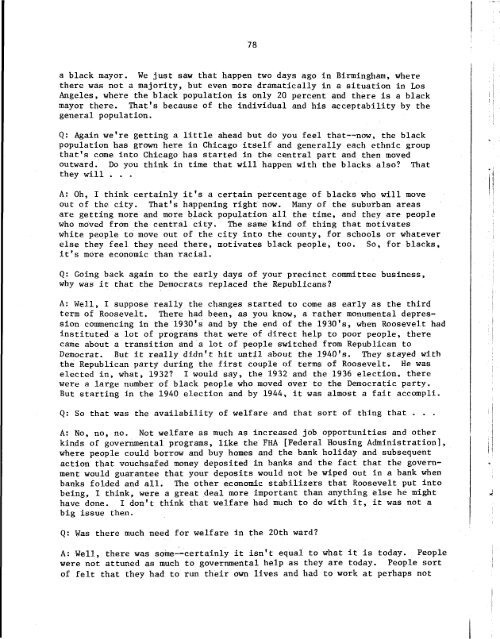Cecil A. Partee Memoir - University of Illinois Springfield
Cecil A. Partee Memoir - University of Illinois Springfield
Cecil A. Partee Memoir - University of Illinois Springfield
You also want an ePaper? Increase the reach of your titles
YUMPU automatically turns print PDFs into web optimized ePapers that Google loves.
a black mayor. We just saw that happen two days ago in Birmingham, where<br />
there was not a majority, but even more dramatically in a situation in Los<br />
Angeles, where the black population is only 20 percent and there is a black<br />
mayor there. That's because <strong>of</strong> the individual and his acceptability by the<br />
general population.<br />
Q: Again we're getting a little ahead but do you feel that--now, the black<br />
population has grown here in Chicago itself and generally each ethnic group<br />
that's come into Chicago has started in the central part and then moved<br />
outward. Do you think in time that will happen with the blacks also? That<br />
they will . . .<br />
A: Oh, I think certainly it's a certain percentage <strong>of</strong> blacks who will move<br />
out <strong>of</strong> the city. That's happening right now. Many <strong>of</strong> the suburban areas<br />
are getting more and more black population all the time, and they are people<br />
who moved from the central city. The same kind <strong>of</strong> thing that motivates<br />
white people to move out <strong>of</strong> the city into the county, for schools or whatever<br />
else they feel they need there, motivates black people, too. So, for blacks,<br />
it's more economic than racial.<br />
Q: Going back again to the early days <strong>of</strong> your precinct committee business,<br />
why was it that the Democrats replaced the Republicans?<br />
A: Well, I suppose really the changes started to come as early as the third<br />
term <strong>of</strong> Roosevelt. There had been, as you know, a rather monumental depression<br />
commencing in the 1930's and by the end <strong>of</strong> the 1930ts, when Roosevelt had<br />
instituted a lot <strong>of</strong> programs that were <strong>of</strong> direct help to poor people, there<br />
came about a transition and a lot <strong>of</strong> people switched from Republican to<br />
Democrat. But it really didn't hit until about the 1940's. They stayed with<br />
the Republican party during the first couple <strong>of</strong> terms <strong>of</strong> Roosevelt. He was<br />
elected in, what, 1932? I would say, the 1932 and the 1936 election, there<br />
were a large number <strong>of</strong> black people who moved over to the Democratic party.<br />
But starting in the 1940 election and by 1944, it was almost a fait accompli.<br />
Q: So that was the availability <strong>of</strong> welfare and that sort <strong>of</strong> thing that . . .<br />
A: No, no, no. Not welfare as much as increased job opportunities and other<br />
kinds <strong>of</strong> governmental programs, like the FHA [Federal Housing Administration 1,<br />
where people could borrow and buy homes and the bank holiday and subsequent<br />
action that vouchsafed money deposited in banks and the fact that the government<br />
would guarantee that your deposits would not be wiped out in a bank when<br />
banks folded and all. The other economic stabilizers that Roosevelt put into<br />
being, I think, were a great deal more important than anythfng else he might<br />
have done. T don't think that welfare had much to do with it, it was not a<br />
big issue then.<br />
Q: Was there much need for welfare in the 20th ward?<br />
A: Well, there was some--certainly it isn't equal to what it is today. People<br />
were not attuned as much to governmental help as they are today. People sort<br />
<strong>of</strong> felt that they had to run their own lives and had to work at perhaps not
















